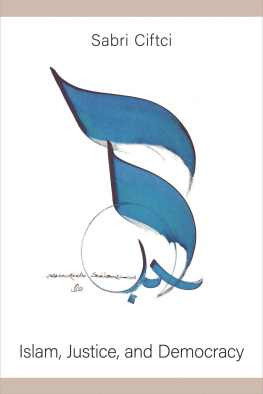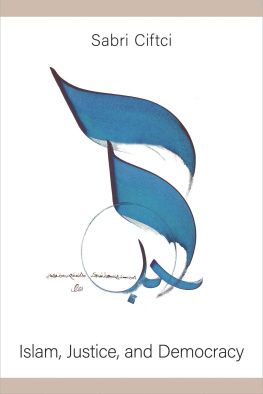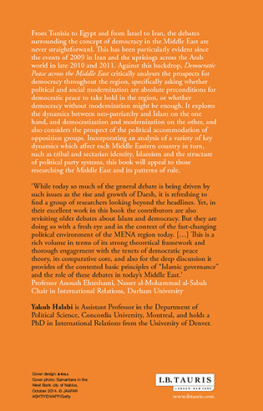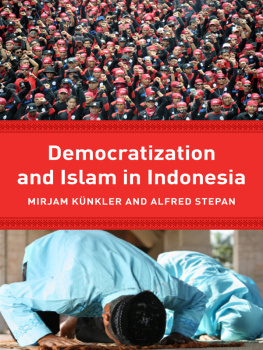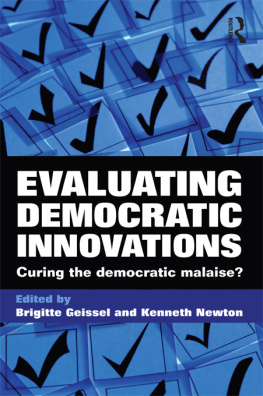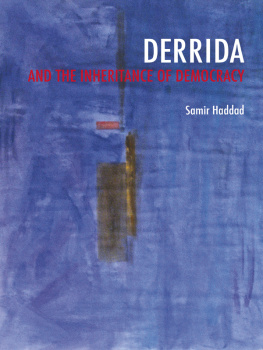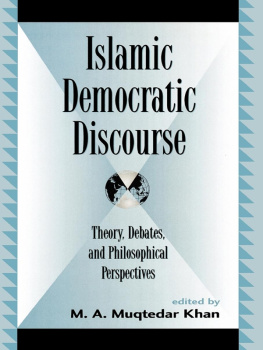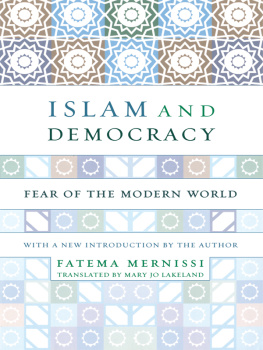Sabri Ciftci - Islam, Justice, and Democracy (Religious Engagement in Democratic Politics)
Here you can read online Sabri Ciftci - Islam, Justice, and Democracy (Religious Engagement in Democratic Politics) full text of the book (entire story) in english for free. Download pdf and epub, get meaning, cover and reviews about this ebook. year: 2021, publisher: Temple University Press, genre: Politics. Description of the work, (preface) as well as reviews are available. Best literature library LitArk.com created for fans of good reading and offers a wide selection of genres:
Romance novel
Science fiction
Adventure
Detective
Science
History
Home and family
Prose
Art
Politics
Computer
Non-fiction
Religion
Business
Children
Humor
Choose a favorite category and find really read worthwhile books. Enjoy immersion in the world of imagination, feel the emotions of the characters or learn something new for yourself, make an fascinating discovery.
- Book:Islam, Justice, and Democracy (Religious Engagement in Democratic Politics)
- Author:
- Publisher:Temple University Press
- Genre:
- Year:2021
- Rating:5 / 5
- Favourites:Add to favourites
- Your mark:
- 100
- 1
- 2
- 3
- 4
- 5
Islam, Justice, and Democracy (Religious Engagement in Democratic Politics): summary, description and annotation
We offer to read an annotation, description, summary or preface (depends on what the author of the book "Islam, Justice, and Democracy (Religious Engagement in Democratic Politics)" wrote himself). If you haven't found the necessary information about the book — write in the comments, we will try to find it.
Islam, Justice, and Democracy (Religious Engagement in Democratic Politics) — read online for free the complete book (whole text) full work
Below is the text of the book, divided by pages. System saving the place of the last page read, allows you to conveniently read the book "Islam, Justice, and Democracy (Religious Engagement in Democratic Politics)" online for free, without having to search again every time where you left off. Put a bookmark, and you can go to the page where you finished reading at any time.
Font size:
Interval:
Bookmark:
Islam, Justice, and Democracy
In the series
Religious Engagement in Democratic Politics, edited by Paul A. Djupe
ALSO IN THIS SERIES:
Luis Felipe Mantilla, How Political Parties Mobilize Religion: Lessons from Mexico and Turkey
Jeremiah J. Castle, Rock of Ages: Subcultural Religious Identity and Public Opinion among Young Evangelicals
Brian R. Calfano and Nazita Lajevardi, ed., Understanding Muslim Political Life in America: Contested Citizenship in the Twenty-First Century
Jeanine Kraybill, One Faith, Two Authorities: Tension between Female Religious and Male Clergy in the American Catholic Church
Paul A. Djupe and Ryan L. Claassen, ed., The Evangelical Crackup? The Future of the Evangelical-Republican Coalition
Islam, Justice, and Democracy
S ABRI C IFTCI

TEMPLE UNIVERSITY PRESS
Philadelphia, Pennsylvania 19122
tupress.temple.edu
Copyright 2022 by Temple UniversityOf The Commonwealth System of Higher Education
All rights reserved
Published 2022
Library of Congress Cataloging-in-Publication Data
Names: ifti, Sabri, author.
Title: Islam, justice, and democracy / Sabri Ciftci.
Other titles: Religious engagement in democratic politics.
Description: Philadelphia : Temple University Press, 2022. | Series: Religious engagement in democratic politics | Includes bibliographical references and index. | Summary: Explores Islam and democracy through historical and empirical treatments of Muslim political attitudes and conceptions of justice, focusing on Muslim agency and placing values at the center of its inquiry Provided by publisher.
Identifiers: LCCN 2021015324 (print) | LCCN 2021015325 (ebook) | ISBN 9781439921494 (cloth) | ISBN 9781439921500 (paperback) | ISBN 9781439921517 (pdf)
Subjects: LCSH: Islam and justice. | Islam and politics. | JusticeReligious aspectsIslam.
Classification: LCC BP173.43 .C54 2022 (print) | LCC BP173.43 (ebook) | DDC 297.2/72dc23
LC record available at https://lccn.loc.gov/2021015324
LC ebook record available at https://lccn.loc.gov/2021015325
 The paper used in this publication meets the requirements of the American National Standard for Information SciencesPermanence of Paper for Printed Library Materials, ANSI Z39.48-1992
The paper used in this publication meets the requirements of the American National Standard for Information SciencesPermanence of Paper for Printed Library Materials, ANSI Z39.48-1992
Printed in the United States of America
987654321
For Semra
and
Bahadr, Yusuf, brahim, and Yiithan
Contents
Figures
Tables
I started working on this book in 2013, the year marking the return of authoritarian systems and conflict to the Middle East after two years of protests and regime transitions. The Arab Spring took many by surprise. More recently, protests erupted in Sudan and Algeria with similar demands of justice and democracy. Much has been said about these waves of mass mobilization and their causes and consequences. However, scholars and pundits did not offer much about the culture of these protests, especially about the values and attitudes of ordinary men and women risking their lives chanting for freedom and justice in the Arab squares. As a student of Islam and democracy, I am truly fascinated by the discourses of rebellion and liberation. The Arab Spring presented an opportunity to examine these discourses in action. In my initial research, I learned that social justice was the most significant element in protesters chants. Therefore, I wanted to understand how Islamic conceptions of justice shape perceptions of ordinary men and women taking to the streets. This was no easy task as I quickly realized that there are deep historical and philosophical roots of conceptions of justice shaping individual attitudes and orientations. Islamic justice discourses may support rival claims about legitimate political orders, sometimes democratic and sometimes authoritarian. I wanted to understand how Islam shapes peoples conceptions of justice and how these conceptions affect their views of democracy and authoritarianism. I wrote this book to provide new insights about justice and democracy from the perspective of devout Muslim men and women.
This book is indebted to many people who have motivated and supported me during its development and writing stages. I presented early drafts of this project in the 2014 and 2017 Annual Meetings of the American Political Science Association (APSA). On both occasions, I got constructive feedback from my colleagues, who encouraged me to study this subject. One useful suggestion concerned the need to get into the field to understand how religious people interpret their faith principles to inform their values and perceptions about justice and democracy. A seed grant from the Center for the Study of Religion and Society at the University of Notre Dame, Global Religion Research Initiative (GRRI), helped me get on the field and conduct interviews in stanbul, Turkey. I am grateful for this funding and, especially, the support provided by Christian Smith, professor of sociology and director of GRRI at Notre Dame (Award #BG5225). I would also like to thank the University Research Compliance Office staff at Kansas State University (KSU) who reviewed and approved the field research proposal (IRB approval #8776).
My field research would not have been successful without the support of many people. To start with, I would like to thank Halil brahim Yenign, who has inspired me with his commitment to Islamic social justice and also introduced me to the members of new Islamic movements. My friends at Islamic Think House (DE, stanbul Dnce Evi) and various social justice organizations in stanbul were very helpful in the success of the field research. They challenged me intellectually with their intriguing ideas about Islam and justice. I especially thank Yusuf Enes Sezgin, Ammar Kl, Kadir Bal, and many others for their valuable comments and support in the fieldwork stage. These individuals helped me understand the true meaning of social justice and benevolence from an Islamic perspective. I am indebted to over two dozen individuals who talked to me for hours to share their understanding of Islam, justice, and politics. Attending the Ramadan dinners in Istanbuls Tarlaba neighborhood was an eye-opener for me. It helped me develop an appreciation of how devotion and charity are related. Especially, the social activist Mehmet Abi left a deep impression on me by demonstrating what true benevolence looks like in practice. As part of field research, I also used the library of lmi Etdler Dernei (LEM) housing the archives of Islamist journals. I am grateful to LEM for opening this archive to the researchers. I especially thank Muhammed Yasir Bodur, for his valuable research assistance and for spending hours in LEM libraries in completing the archival text collection. Muhammed Yasir is also a social activist who provided many insights about Islamic justice conceptions while working as a research assistant for me.
I would also like to thank several colleagues who engaged with me regularly throughout my career and during the writing stage of this book. Thank you, Mark Tessler, for inspiring me to study the attitudes of ordinary Muslim men and women and for your continued support of my research. I am grateful to Amaney Jamal for inviting me to present one of the first drafts of this book in the After the Uprisings conference in Bobst Center for Peace and Justice at Princeton University and Michael Robbins for a second invitation to American University in Beirut to attend the Social Justice in the Arab World conference. I am also grateful for the comments provided by Michael Platow, the president of the International Society for Justice Research (ISJR) during the 2018 ISJR meeting in Atlanta, Georgia. The participants in two APSA meetings also provided helpful comments, including Ariel Ahram at the 2017 meeting. My colleague John Warner helped me understand the Western justice theory and patiently responded to my emails about reading recommendations. I especially want to express my gratitude to Michael Wuthrich and Ammar Shamaileh for encouraging me throughout the process, reading drafts of different chapters, and providing valuable feedback about these chapters. Finally, I thank Dale L. Smith who has been a lifelong mentor and has always shown deep interest in my work.
Next pageFont size:
Interval:
Bookmark:
Similar books «Islam, Justice, and Democracy (Religious Engagement in Democratic Politics)»
Look at similar books to Islam, Justice, and Democracy (Religious Engagement in Democratic Politics). We have selected literature similar in name and meaning in the hope of providing readers with more options to find new, interesting, not yet read works.
Discussion, reviews of the book Islam, Justice, and Democracy (Religious Engagement in Democratic Politics) and just readers' own opinions. Leave your comments, write what you think about the work, its meaning or the main characters. Specify what exactly you liked and what you didn't like, and why you think so.

